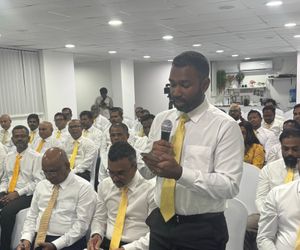No conflict of interest as JSC member, presidential candidate: Gasim
22 Jul 2013, 14:09
Jumhoree Party (JP) Presidential Candidate Gasim Ibrahim has told reporters he will not step down from his position on the Judicial Services Commission (JSC), stating that he saw no conflict of interest between his bid for power and role on the judicial watchdog.
The JP held a press conference yesterday with its two recently-unveiled coalition partners, the religious conservative Adhaalath Party and the Dhivehi Qaumee Party (DQP), following their defection from President Mohamed Waheed’s ‘Forward with the nation’ coalition last week.
According to local news outlet Haveeru, journalists repeatedly asked Gasim how he could possibly remain an impartial member of the JSC while running for president.
In response, Gasim said he saw no conflict of interest, and insisted that he would “not neglect his legal obligations” as a JSC member.
Become a member
Get full access to our archive and personalise your experience.
Already a member?
Discussion
No comments yet. Be the first to share your thoughts!
No comments yet. Be the first to join the conversation!
Join the Conversation
Sign in to share your thoughts under an alias and take part in the discussion. Independent journalism thrives on open, respectful debate — your voice matters.




